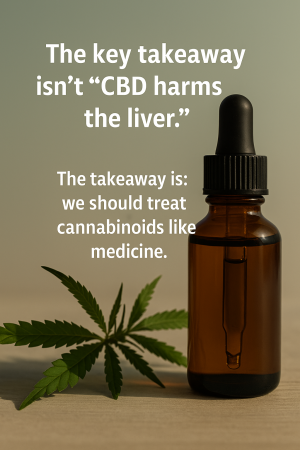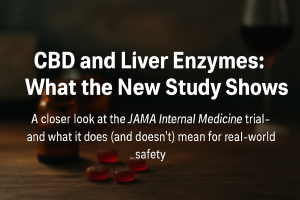Table of Contents
- A clear-eyed look at the data, the media spin to come, and what patients and clinicians actually need to know
- The Big Misunderstanding: Lab Changes ≠ Liver Damage
- What’s Consistent Across Studies
- What’s Different About This Study
- 🚨 Alarm Bells vs. Actual Evidence:
- 🔍 Perspective Check: CBD vs. Common Liver Enzyme Offenders
- 🔎 FAQ: CBD and Liver Enzymes
- 1. Is CBD bad for your liver?
- 2. What did the 2025 JAMA study on CBD and liver enzymes find?
- 3. What liver enzymes were affected by CBD?
- 4. Was this study about real-world CBD products?
- 5. Should I stop taking CBD because of this study?
- 6. How high were the CBD doses in the study?
- 7. Did anyone experience liver failure or clinical symptoms?
- 8. Is full-spectrum CBD safer for the liver?
- 9. Was the placebo group affected?
- 10. What are signs of liver stress from supplements?
- 11. Can CBD be safely dosed long-term?
- 12. Does this study prove CBD is dangerous?
- 13. Can low-dose CBD cause liver problems too?
- 14. Why are liver enzymes important when taking CBD?
- 15. Is this the first study linking CBD to liver enzyme changes?
- 16. How does this study affect the future of CBD regulation?
A clear-eyed look at the data, the media spin to come, and what patients and clinicians actually need to know
What You’ll Learn in This Post:
❇️ What the July 7, 2025 JAMA Internal Medicine study tested, and why its methodology matters
❇️ What the findings actually say—and don’t say—about CBD and liver enzyme elevations
❇️ Where this study fits among the broader CBD safety literature
❇️ How to interpret lab changes like ALT/AST elevations in clinical context
❇️ What this means for patients, clinicians, and regulators alike
A Study Worth Attention
On July 7, 2025, JAMA Internal Medicine published a rigorously designed clinical trial titled: “Cannabidiol and Liver Enzyme Level Elevations in Healthy Adults: A Randomized Clinical Trial” by Jeffry Florian, PharmD; Pablo Salcedo, PhD; Keith Burkhart, MD; Aanchal Shah, PhD; Lakshmi Manasa S. Chekka, PhD; Dro Keshishi, PhD; Vikram Patel, MD; ShanChao Yang, MD; Melanie Fein, MD; Ryan DePalma, MD; Murali Matta, PhD; David G. Strauss, MD; and Rodney Rouse, MD. (Read PDF here)
This randomized, double-blind, placebo-controlled trial studied 201 healthy adults who were given 5 mg/kg/day of purified CBD isolate (Epidiolex-grade) for four weeks. Weekly liver panels tracked changes in key enzymes—ALT, AST, ALP, and bilirubin.
The topline finding? 8 participants in the CBD group (5.6%) had ALT or AST elevations >3× the upper limit of normal. Zero placebo participants did. Yet no one developed symptoms, bilirubin abnormalities, or liver injury. All enzyme elevations reversed after CBD cessation.
Now let’s dissect what this study really tells us—and how it fits into the broader landscape of cannabinoid safety.

What This Study Got Right
In a field often flooded with retrospective surveys, unblinded cohort data, and inconsistent cannabis formulations, this trial stands out for its methodological discipline. The authors of “Cannabidiol and Liver Enzyme Level Elevations in Healthy Adults,” published July 7, 2025 in JAMA Internal Medicine, got several things exactly right.
1. It Was a True Randomized Controlled Trial
This was no observational study or secondary analysis. It was a prospective, randomized, double-blind, placebo-controlled trial—the gold standard of clinical research. The investigators pre-specified endpoints, maintained dosing consistency, and ensured blinding across all arms.
2. Dosing and Product Consistency
Rather than aggregating data from various unstandardized products, the study used Epidiolex-grade purified CBD isolate at a tightly controlled dose of 5 mg/kg/day, given as two divided doses. That translates to roughly 350 mg/day for a 70 kg adult. It was pharmaceutical-grade, devoid of confounders like THC, terpenes, or other cannabinoids.
3. High-Frequency, High-Fidelity Monitoring
Participants received weekly liver enzyme testing (ALT, AST, ALP, bilirubin) and daily electronic diaries to report symptoms and potential adverse events. This level of oversight is rare in cannabinoid research, where follow-ups are often months apart or missing altogether.
4. Transparent Safety Outcomes
Rather than simply noting enzyme changes, the researchers tracked whether these changes met recognized safety thresholds (e.g., >3× ULN), whether they were accompanied by other signs of liver stress (e.g., bilirubin elevation), and whether they resolved. The data were not sensationalized—just clearly reported.
5. No Evidence of Clinical Injury
Despite the enzyme elevations, there were:
-
No Hy’s Law cases (ALT/AST elevation + bilirubin elevation = high risk of DILI)
-
No symptoms or adverse clinical outcomes
-
No persistent lab abnormalities
The enzyme elevations were asymptomatic, transient, and fully reversible.
What This Study Missed
For all its rigor, the study still leaves important gaps. That’s not a criticism—it’s the nature of early-phase research. Still, to responsibly interpret the findings, it’s worth understanding what the study didn’t explore, couldn’t answer, or chose not to measure.
1. It Didn’t Study Real Patients
The trial enrolled only healthy adults—no chronic illness, no prescription medications, and no pre-existing liver conditions. That makes sense for safety profiling, but it limits generalizability. The people actually using CBD for pain, anxiety, inflammation, insomnia, or epilepsy are often older, on polypharmacy, or managing chronic disease. This study tells us how CBD affects pristine systems, not real-world ones.
2. The Dose Was High—Uncommonly So
The participants received 5 mg/kg/day of CBD isolate, split into two doses—around 350 to 500 mg/day for the average adult. That’s far beyond what most consumers use, even at CED Clinic where we are keeping up with latest in patient care and following individuals carefully and over years. This is beyond what most patients receive, especially outside of epilepsy treatment. In typical practice, CBD doses range from 10 to 100 mg/day, and often include additional cannabinoids like THC or terpenes that may modulate metabolism and liver load. The findings here can’t be applied to those more common, lower-dose regimens.
3. It Didn’t Explore Functional or Mechanistic Outcomes
The study showed that ALT and AST increased in a small subset of participants. But why those elevations occurred remains unexamined. Were these participants slow metabolizers? Was there any associated oxidative stress? Inflammation? Mitochondrial changes? No metabolomics, cytokine profiles, pharmacogenomics, or functional testing was done to contextualize the enzymatic response.
4. It Used CBD Isolate Only
While isolate allows clean pharmacology, it doesn’t reflect what’s actually on shelves. Most over-the-counter products are full-spectrum or broad-spectrum, containing other cannabinoids (CBG, CBN, trace THC), terpenes, and botanical compounds. These may affect liver metabolism through entourage effects or CYP450 modulation. The study’s findings can’t be extrapolated to non-isolate products.
5. It Captured Only Short-Term Use
The trial lasted just four weeks. That limits what we know about longer-term liver effects, adaptation, or resolution over time. Many patients use CBD chronically—sometimes for years. Do transient enzyme elevations resolve and stay normal? Do they recur? Do they plateau? This study can’t say.
6. No Symptom Correlation
While the enzyme elevations were asymptomatic, the study didn’t assess whether people felt differently—better or worse—on CBD. Did sleep improve? Did anxiety worsen? Were there subclinical effects on cognition, energy, or digestion? None of that was reported, even though participants kept daily symptom diaries.
7. No Exploration of Inter-Individual Variability
Roughly 1 in 18 participants had significant enzyme elevations. Who were they? Did they share metabolic features? Genetic polymorphisms? Gut microbiome profiles? Alcohol use? Without that information, it’s impossible to assess which users may be at greater risk.

The Big Misunderstanding: Lab Changes ≠ Liver Damage
This is where most conversations around this study tend to unravel—confusing enzyme elevations with evidence of harm.
Let’s clarify:
Just because a liver enzyme rises doesn’t mean liver damage has occurred. In fact, mild ALT or AST elevations are incredibly common, transient, and often meaningless outside a clinical context. They can be caused by:
-
A few days of ibuprofen or acetaminophen
-
Drinking alcohol
-
A new antibiotic
-
Strenuous exercise
-
Even fasting
Yet when the compound is CBD, those same lab shifts are interpreted with dramatic alarm. That’s not scientific. That’s selective skepticism.
This trial reported that 5.6% of healthy adults given high-dose CBD isolate developed ALT or AST elevations >3× the upper limit of normal. That’s the typical threshold for flagging possible drug-induced liver injury (DILI) in early-phase trials. But let’s look closer:
-
Zero participants developed symptoms
-
No bilirubin elevations occurred (which would suggest impaired clearance)
-
No one met Hy’s Law criteria, the FDA’s red flag for liver toxicity
-
All enzyme elevations resolved spontaneously, within 2–3 weeks after stopping CBD
If this were any other compound—especially one with FDA approval—these findings would be reported as reversible, asymptomatic lab variations. But because it’s CBD, the narrative often becomes: “CBD causes liver damage.”
That’s inaccurate, and irresponsible.

What This Study Does—and Doesn’t—Prove
✅ It shows that in healthy adults, high-dose purified CBD can cause temporary elevations in liver enzymes in a small subset of users.
❌ It doesn’t show that CBD causes permanent damage, clinical liver injury, or risk at typical doses.
The lack of clinical symptoms, bilirubin elevation, or persistently abnormal labs matters enormously.
Because liver enzymes are indicators, not verdicts. They fluctuate in response to a wide range of metabolic activity—not just damage. What matters most is:
-
Magnitude of change
-
Duration of elevation
-
Presence of symptoms or concurrent lab changes
-
Reversibility
In this case, the signal was mild, transient, asymptomatic, and reversed after stopping. That’s a very different story than “CBD is hepatotoxic.” (= toxic to the liver)
How This Study Compares to the Broader Body of CBD and Liver Safety Research
This trial—rigorous, well-controlled, and pharmacologically specific—is a welcome contribution to the field. But it’s not the first to explore this question, and its findings neither confirm a long-standing danger nor contradict the larger evidence base. To contextualize it properly, we need to compare it to what’s already out there.
What’s Consistent Across Studies
-
Liver enzyme elevations have been observed before
The FDA’s original approval of Epidiolex (a CBD isolate) in 2018 was based on data from clinical trials in patients with epilepsy, including Dravet and Lennox-Gastaut syndromes. In those trials, liver enzyme elevations—particularly ALT and AST—were dose-dependent and more common in patients taking concurrent valproate, a known hepatotoxic antiepileptic.-
FDA data showed up to 13% of patients had ALT/AST elevations >3x ULN when taking 20 mg/kg/day of CBD with valproate.
-
In patients not on valproate, the rate was 3%.
This JAMA study’s rate—5.6% at 10 mg/kg/day—is in line with that existing data.
-
-
Liver abnormalities are typically asymptomatic and reversible
Across multiple studies, the pattern is the same: ALT and AST may rise, but true liver injury is rare, and labs normalize upon discontinuation. Even in children and those with neurologic conditions, CBD-induced liver failure is not reported in the peer-reviewed literature. -
Dose matters
Higher doses—especially over 10–15 mg/kg/day—are more likely to trigger lab changes. In contrast, most commercial CBD products deliver doses in the range of 10–50 mg total per day, not per kg. That’s a 10– to 50-fold difference compared to the regimens used in this study and others like it.
What’s Different About This Study
-
It studied healthy adults—not patients
Previous data came almost exclusively from pediatric epilepsy populations or people with serious underlying conditions. This study, by contrast, enrolled 201 healthy adults with no comorbidities or concurrent medications. That gives it cleaner internal validity, but limits external relevance to the people actually using CBD for therapeutic reasons. -
It excluded real-world formulations
While earlier studies focused on Epidiolex or even commercial oils, this study used pure CBD isolate in gelatin capsules. That rules out variability, but also misses the entourage effect—where other cannabinoids, flavonoids, or terpenes might influence absorption, metabolism, or risk. -
Its short duration narrows interpretation
Four weeks of use tells us something—but not much about long-term CBD safety. Most real-world users take CBD for months or years. We still lack data on chronic exposure at therapeutic doses, especially across diverse demographics and use cases. -
It removed known confounders, which are part of real life
This trial excluded people on medications, with liver disease, or with significant alcohol use. That allows cleaner attribution of effects to CBD—but real-world users often do have those risks. We still don’t know how CBD interacts with those variables in typical use scenarios.
📌 Bottom line:
This trial fits comfortably within the safety signal observed in earlier CBD studies—but it also narrows the question so much that its broader relevance becomes limited. It’s valuable for regulators and researchers, but only a partial answer to real-world questions about CBD safety.
What This Study Means for Clinical Practice and Consumer Guidance
This trial should be seen less as a warning sign and more as a benchmark: a tightly controlled study that tells us what can happen in a subset of people, under specific circumstances—not what does happen to most people using CBD therapeutically or casually.
Here’s how to think about the practical takeaways:
🧠 For Clinicians:
-
Monitor when high doses are involved
If a patient is using more than 200–300 mg/day of CBD isolate—or titrating up for seizure, severe anxiety, or chronic pain—consider checking baseline liver function tests (LFTs) and repeating them after a few weeks. Especially if the patient is taking other hepatically metabolized drugs (e.g., valproate, statins, azoles, SSRIs). -
Contextualize enzyme elevations
A modest bump in ALT or AST doesn’t equal toxicity. If bilirubin, ALP, and synthetic function (INR, albumin) are normal—and the patient is asymptomatic—it’s reasonable to monitor rather than stop CBD prematurely. -
Personalize dosing discussions
Emphasize that liver effects, when they occur, are dose-dependent and transient in the vast majority of users. Encourage patients to stick to lower effective doses and to increase only when necessary, ideally with support from a knowledgeable provider.

🌿 For Consumers:
-
Don’t panic about liver enzymes
A small proportion of users at very high doses might experience elevated liver enzymes—but this doesn’t mean the liver is being harmed. In this study, no one developed liver disease, and all abnormalities reversed after stopping CBD. -
Stick to appropriate doses
Most over-the-counter products contain 10–50 mg per serving. That’s far below the doses studied here (300–500 mg/day). If you’re staying within that lower range and not taking other liver-sensitive medications, your risk is likely very low. -
Read labels—and verify them
Not all CBD products are created equal. Seek out brands that publish third-party Certificates of Analysis (COAs) with batch-specific dosing and contaminant data. Products with accurate labeling, GMP compliance, and low variability are safer and more predictable. -
If in doubt, check your labs
If you’re using high-dose CBD, or combining it with other medications, it’s reasonable to ask your doctor to run a liver panel. Most changes, if they occur, are minor and reversible—but it’s always better to be informed.
🧭 Overall Guidance
This study doesn’t tell patients to stop using CBD. It tells us that, like any compound with physiological activity, CBD can produce measurable effects in the body—some of which merit monitoring when used at pharmacologic doses.
The best response isn’t alarmism. It’s thoughtful, informed use—paired with transparency from manufacturers, education for prescribers, and regulatory clarity for all.
Final Thoughts: Science, Sanity, and CBD Safety
“Cannabidiol and Liver Enzyme Level Elevations in Healthy Adults: A Randomized Clinical Trial,” published July 7, 2025, in JAMA Internal Medicine, doesn’t offer a verdict on CBD. It offers a data point—a rigorously collected one—about what happens to liver enzymes in a small group of healthy people taking high doses of pharmaceutical-grade CBD isolate.
Here’s the grounded truth:
♦︎ Yes, a small percentage of users had elevated ALT or AST levels.
♦︎ No, there was no liver injury, no bilirubin rise, no clinical symptoms, and no lasting harm.
♦︎ Yes, the enzyme changes reversed after CBD was stopped.
♦︎ No, this does not apply to typical users taking far lower doses of full-spectrum products.
♦︎ And yes—we should pay attention. Not because CBD is dangerous, but because real-world cannabis care deserves the same scrutiny, structure, and respect as any other medical intervention.
This study is not a scandal. It’s a call for nuance:
✔️ A call for regulators to distinguish between low-dose, over-the-counter CBD and clinical-grade, high-dose therapies.
✔️ A call for physicians to move beyond reflexive fear and learn how to interpret cannabinoid pharmacology.
✔️ A call for patients to understand that plant-based care isn’t exempt from needing guidance, precision, or evidence.
✔️ And most of all, a call for a public health culture that doesn’t confuse lab noise with clinical signal.
⚡ In short: this study doesn’t tell us to stop using CBD. It tells us to start doing it smarter.

( Dr C: Here’s a new section I’m trying out…. )
🚨 Alarm Bells vs. Actual Evidence:
What Critics Will Say—And What the Study Really Shows
As media headlines start to circle, expect strong opinions. But not all takes are created equal. Here’s a breakdown of the most common alarmist claims we’re likely to hear—and the facts that quietly undercut them.
💣 Claim #1: “CBD Causes Liver Damage”
Counterpoint:
No participants in the trial experienced liver damage.
-
No bilirubin elevation (a key marker of liver dysfunction)
-
No symptoms like jaundice or abdominal pain
-
No Hy’s Law cases (a red-flag combo of elevated ALT + bilirubin)
-
No long-term harm—all enzyme elevations resolved after stopping CBD
🔍 Lab changes ≠ liver injury. Context matters.
📈 Claim #2: “5.6% Had Dangerous ALT Elevations!”
Counterpoint:
True—8 out of 133 in the CBD group saw ALT or AST >3× ULN.
But that definition threshold is a screening tool, not a diagnosis.
-
Tylenol, statins, alcohol, and vigorous exercise can also cause transient enzyme bumps.
-
No participant got sick.
-
The elevation was temporary, asymptomatic, and reversible.
🧪 Drug development guidelines flag this for monitoring—not panic.
🔬 Claim #3: “This Proves CBD Isn’t Safe”
Counterpoint:
This study shows that high-dose, pharmaceutical-grade CBD isolate can transiently affect liver enzymes in healthy people. That’s not the same as declaring CBD broadly unsafe.
-
Typical CBD doses are 20–100 mg/day—not the 300–500+ mg/day used here
-
Most real-world products are full-spectrum, not pure isolate
-
Most users aren’t healthy volunteers—they’re patients using titrated doses for clinical needs
⚖️ Safety isn’t binary. It’s about dose, duration, product, and person.
🥼 Claim #4: “If 5.6% Had Reactions, CBD Shouldn’t Be OTC”
Counterpoint:
Regulatory thresholds for OTC products already tolerate low risks—when properly labeled, dosed, and monitored.
-
Even widely used OTC meds (like NSAIDs or acetaminophen) carry known liver risks
-
This study supports dose clarity and GMP manufacturing, not prohibition
-
Proper oversight can manage these mild risks far better than prohibition ever will
📋 This argues for smarter policy—not stricter prohibition.
🧠 Claim #5: “Enzyme Bumps Mean Cumulative Damage”
Counterpoint:
The study lasted 4 weeks. What it showed was acute, self-resolving enzyme elevation with high-dose CBD—not cumulative toxicity.
-
No worsening over time
-
No trend toward organ dysfunction
-
No signs of progression to liver disease
⏳ We need long-term studies—but there’s no evidence here of building harm.
🎯 Bonus: What the Study Didn’t Show
✔️ Nothing about full-spectrum or broad-spectrum CBD
✔️ Nothing about low-dose daily use
✔️ Nothing about patient populations with chronic illness
✔️ Nothing about cannabinoid synergy (e.g., CBD + THC)
✔️ Nothing about long-term liver outcomes
🧭 This trial answered a narrow question—let’s not let it be misused as a broad indictment.
🔍 Perspective Check: CBD vs. Common Liver Enzyme Offenders
If the idea of liver enzyme elevations sounds alarming, it’s worth asking: compared to what?
Elevations in ALT and AST—like the ones seen in this CBD trial—aren’t rare in medicine. In fact, several widely used and FDA-approved substances are known to trigger transient liver enzyme increases, often at similar or higher rates.
Here’s how CBD stacks up:
| Substance | ALT/AST Elevation Risk | Comments |
|---|---|---|
| Acetaminophen (Tylenol) | ~15–30% of users at high doses | Can elevate enzymes without symptoms; severe overdose is hepatotoxic |
| Statins (cholesterol meds) | ~3–5% | Mild enzyme bumps are expected and typically non-progressive |
| Amoxicillin-clavulanate | Rare, but can cause Drug-Induced Liver Injury | One of the leading causes of antibiotic-induced liver injury |
| NSAIDs (ibuprofen, naproxen) | Up to 15% in long-term use | Typically mild, reversible, and asymptomatic |
| Alcohol (moderate-heavy) | Variable | Regular intake often causes enzyme elevations, even without overt liver disease |
| High-dose CBD (this trial) | 5.6% | Enzyme elevations resolved post-discontinuation; no symptoms or liver damage |
⚠️ In this context, the findings of the CBD trial are unremarkable. A 5.6% elevation rate with no associated symptoms or liver dysfunction places CBD in the company of many everyday substances—some of which are available over-the-counter or taken chronically without lab monitoring.
🎯 Takeaway: Mild enzyme bumps aren’t unique to CBD. What matters most is whether those changes are dose-dependent, symptomatic, reversible, and clinically significant. In this trial, the answer is reassuring across the board.
🔎 FAQ: CBD and Liver Enzymes
1. Is CBD bad for your liver?
Not inherently—but high doses may cause elevated liver enzymes, as seen in a 2025 randomized trial. This doesn’t mean CBD causes liver damage across the board, but it does highlight the need for caution with dosage and duration. Especially in healthy users, these lab shifts often go unnoticed symptomatically. Your liver may not “feel” it, but blood tests can still pick it up.
2. What did the 2025 JAMA study on CBD and liver enzymes find?
The study found that over 60% of healthy adults taking 1600 mg/day of purified CBD showed elevated liver enzymes after 28 days. No participants developed symptoms or liver injury, and enzyme levels returned to baseline after discontinuation. The trial was well-controlled but used high, non-representative doses. These findings raise important questions about dose-dependent liver stress in otherwise healthy individuals.
3. What liver enzymes were affected by CBD?
The primary markers elevated were ALT (alanine aminotransferase) and AST (aspartate aminotransferase)—common indicators of liver inflammation or stress. Some individuals exceeded three times the upper limit of normal, which can be a red flag for clinicians. The study also measured alkaline phosphatase (ALP) and bilirubin, though these changes were less consistent. It’s worth noting that these changes resolved without injury.
4. Was this study about real-world CBD products?
No. The study used pharmaceutical-grade CBD isolate in tightly controlled capsules, not over-the-counter tinctures, gummies, or full-spectrum oils. It doesn’t account for the complex cannabinoid profiles, varying doses, or product impurities that characterize most consumer products. That makes direct extrapolation difficult, but still worthy of clinical caution.
5. Should I stop taking CBD because of this study?
Not necessarily. If you’re using lower doses of full- or broad-spectrum CBD under medical guidance, this study may not apply directly to your situation. However, it does underscore the importance of dose awareness, product quality, and liver monitoring—especially with higher doses or long-term use. Talk to your doctor if you’re concerned or have preexisting liver issues.
6. How high were the CBD doses in the study?
Participants received 1600 mg/day of CBD isolate—divided into two doses daily for 28 days. That’s far higher than what most people take recreationally or therapeutically, which usually ranges between 10 and 100 mg per day. The study intentionally used high doses to test the liver’s threshold for response. The results highlight what might happen when CBD is used aggressively.
7. Did anyone experience liver failure or clinical symptoms?
No. Although liver enzymes increased in some participants, none developed symptoms or required intervention. No participant met criteria for drug-induced liver injury (DILI). All enzyme levels returned to normal after stopping CBD. This suggests the changes were reversible and not indicative of lasting harm.
8. Is full-spectrum CBD safer for the liver?
This study did not assess full-spectrum or broad-spectrum products, so it can’t answer that question directly. However, many clinicians believe that full-spectrum products—when used at lower doses—may carry a different metabolic profile and potentially lower risk. More research is needed to confirm or refute that theory. Until then, caution is advised when using high-dose isolates.
9. Was the placebo group affected?
Not at all. None of the placebo participants exhibited elevations in liver enzymes, which strengthens the signal that CBD was responsible. This clean placebo outcome adds credibility to the findings, even though the study can’t fully isolate every confounding factor. It supports the idea that high-dose CBD was likely the driver of the lab abnormalities.
10. What are signs of liver stress from supplements?
Fatigue, nausea, abdominal pain, jaundice, or dark urine can all suggest liver stress, though most people with liver enzyme elevations feel nothing at all. That’s why lab monitoring is important, especially with long-term or high-dose use of any supplement. In this study, there were no symptoms—just silent enzyme shifts. Liver stress is often a silent signal before damage occurs.
11. Can CBD be safely dosed long-term?
That depends on the formulation, dose, co-medications, and the individual’s liver health. This study didn’t explore long-term safety, but it does indicate that even short-term high doses can prompt lab changes. For most low- to moderate-dose users, especially with full-spectrum products, long-term safety remains plausible but unconfirmed. Regular monitoring is prudent.
12. Does this study prove CBD is dangerous?
No—but it challenges the idea that CBD is completely risk-free. It shows that even natural substances can affect the liver under the right conditions. The takeaway isn’t fear, but responsibility: dose matters, formulation matters, and follow-up care matters. Smart use is the middle ground between hype and fear.
13. Can low-dose CBD cause liver problems too?
The study didn’t test this directly, so we can’t say for sure. Most clinical experience suggests low-dose CBD is well tolerated, especially in people without liver disease. However, it’s wise to remain alert for interactions with other medications or conditions that strain liver function. More dose-ranging research is needed.
14. Why are liver enzymes important when taking CBD?
Liver enzymes are often the first signal that the liver is reacting to a substance—even if no symptoms are present. Since CBD is metabolized in the liver, tracking enzymes like ALT and AST can help detect problems early. This is especially important for people on medications that also affect liver function. It’s a precaution, not a panic.
15. Is this the first study linking CBD to liver enzyme changes?
No, but it’s the most rigorous to date. Earlier studies hinted at similar findings, but they lacked the size, control, or transparency of this one. This randomized, placebo-controlled trial adds weight to the concern while also offering better data. It doesn’t close the book—it just sharpens the picture.
16. How does this study affect the future of CBD regulation?
It strengthens the case for stricter oversight—particularly regarding labeling, dosing, and manufacturing standards. Consumers deserve clarity about what they’re taking and at what risk. Regulators may use this data to demand more precise formulations and post-market safety tracking. This isn’t anti-CBD—it’s pro-accountability.


